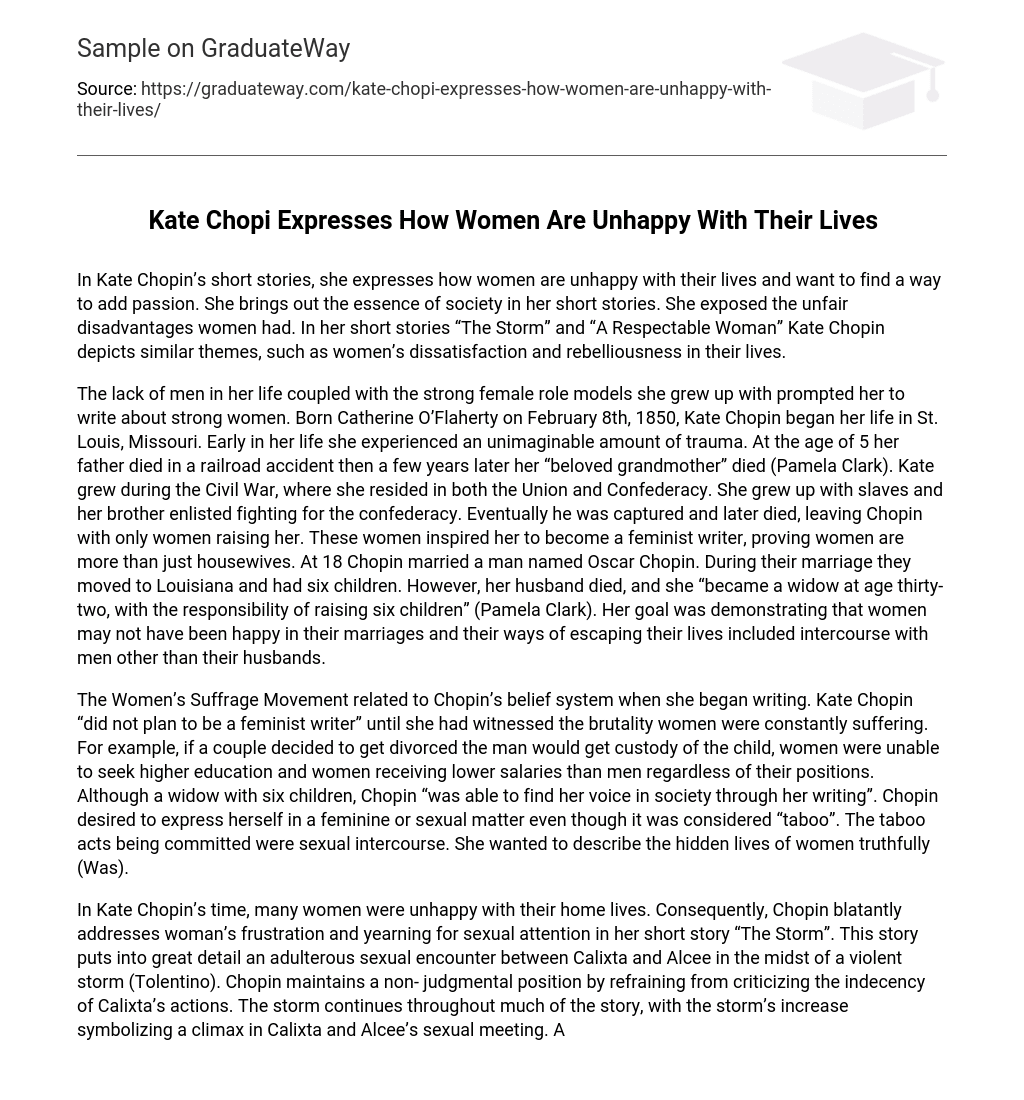In Kate Chopin’s short stories, she expresses how women are unhappy with their lives and want to find a way to add passion. She brings out the essence of society in her short stories. She exposed the unfair disadvantages women had. In her short stories “The Storm” and “A Respectable Woman” Kate Chopin depicts similar themes, such as women’s dissatisfaction and rebelliousness in their lives.
The lack of men in her life coupled with the strong female role models she grew up with prompted her to write about strong women. Born Catherine O’Flaherty on February 8th, 1850, Kate Chopin began her life in St. Louis, Missouri. Early in her life she experienced an unimaginable amount of trauma. At the age of 5 her father died in a railroad accident then a few years later her “beloved grandmother” died (Pamela Clark). Kate grew during the Civil War, where she resided in both the Union and Confederacy. She grew up with slaves and her brother enlisted fighting for the confederacy. Eventually he was captured and later died, leaving Chopin with only women raising her. These women inspired her to become a feminist writer, proving women are more than just housewives. At 18 Chopin married a man named Oscar Chopin. During their marriage they moved to Louisiana and had six children. However, her husband died, and she “became a widow at age thirty-two, with the responsibility of raising six children” (Pamela Clark). Her goal was demonstrating that women may not have been happy in their marriages and their ways of escaping their lives included intercourse with men other than their husbands.
The Women’s Suffrage Movement related to Chopin’s belief system when she began writing. Kate Chopin “did not plan to be a feminist writer” until she had witnessed the brutality women were constantly suffering. For example, if a couple decided to get divorced the man would get custody of the child, women were unable to seek higher education and women receiving lower salaries than men regardless of their positions. Although a widow with six children, Chopin “was able to find her voice in society through her writing”. Chopin desired to express herself in a feminine or sexual matter even though it was considered “taboo”. The taboo acts being committed were sexual intercourse. She wanted to describe the hidden lives of women truthfully (Was).
In Kate Chopin’s time, many women were unhappy with their home lives. Consequently, Chopin blatantly addresses woman’s frustration and yearning for sexual attention in her short story “The Storm”. This story puts into great detail an adulterous sexual encounter between Calixta and Alcee in the midst of a violent storm (Tolentino). Chopin maintains a non- judgmental position by refraining from criticizing the indecency of Calixta’s actions. The storm continues throughout much of the story, with the storm’s increase symbolizing a climax in Calixta and Alcee’s sexual meeting. At first, the apparent desire between the pair is channeled into a nervous tension, and the effort to restrain their physical longing is prominent.
Calixta exclaims “If this keeps up, Dieu sait if the levees goin’ to stan it!”, which reveals the swelling of their passion and the fading of their resistance (Chopin 2). Later, A bolt of lightning disrupts the lovers’ worried tension, as it strikes the chinaberry tree. The powerful crash precipitates Calixta and Alcee’s first kiss, and the affair that prospers intensely matches the furious storm (Tolentino). The storm intensifies, which Calixta views as a delightful counterpart to their passionate love-making, for, “they did not heed the crashing torrents, and the roar outside made her giggle as she rest in his arms.” (Chopin). Through Chopin’s portrayal of the storm, she shows the progressing love affair.
Along with “The Storm”, “A Respectable Woman” also exhibits women’s dissatisfaction. Mrs. Baroda entertains a guest, a former college friend of her husbands, Gouvernail. As Chopin describes Mrs. Baroda’s response to Gouvernail, it seems as if she doesn’t like him: “he made no direct appeal to her approval or even esteem” (Chopin). Yet she develops an attraction to him. The intensity of the attraction terrifies her, because she values respect and loyalty. But Gouvernail speaks seductively though he does not intend to seduce her, “She wanted to reach out her hand in the darkness and touch him with the sensitive tips of her fingers” (Chopin). For many months, whenever her husband requests that Gouvernail come again, she refuses, because he disrupted her routine.
Prior to meeting him, she was content with her marriage; now her loyalty wavers. However, after a summer has passed, Mrs. Baroda herself suggests having Gouvernail return. Mrs. Baroda’s final, bantering words are, “I have overcome everything! you will see. This time I shall be very nice to him” (Chopin 2). She intends to indulge the fantasies about Gouvernail, and she seems determined to turn them into reality. If “A Respectable Woman” “had been written as a typical Victorian story”, Mrs. Baroda would have kept Gouvernail at a distance to reserve her marriage (Titi). Mrs. Baroda decides that having a rich and full emotional life leads to contentment (Titi).
“The Storm” portrays Calixta acting against society’s standards in marriage. She believes the affair that happens will make their relationships with their spouses better (Tolentino).





